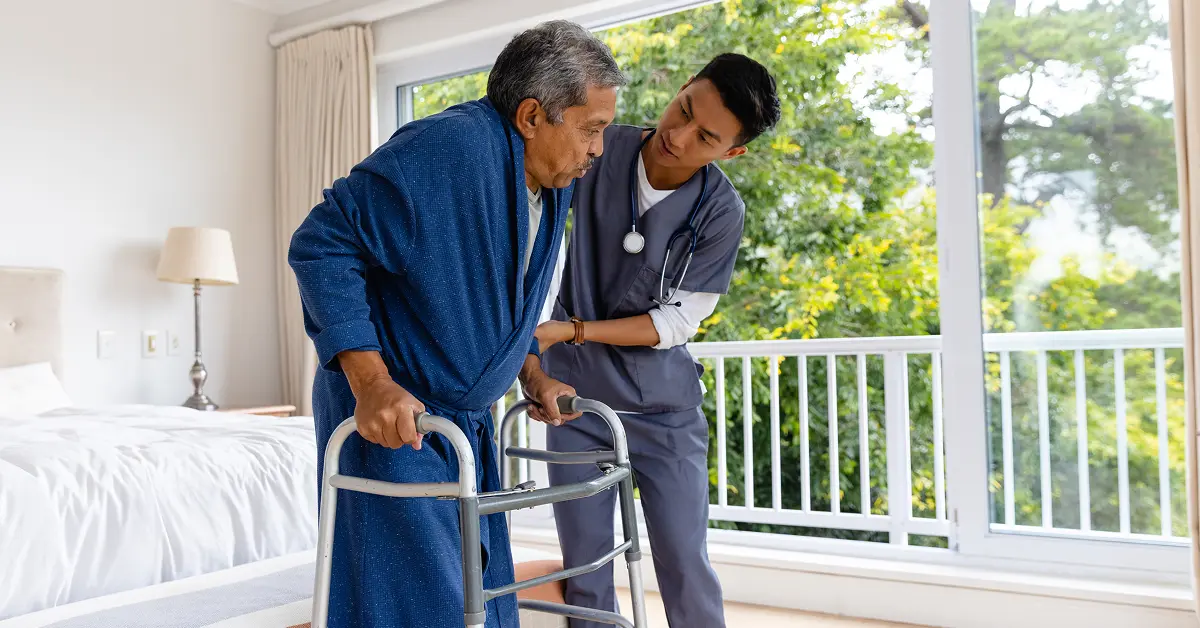As the Indian population ages, families across the country face a crucial decision: whether to opt for in-home Elderly Care Services or move their ageing parents or relatives to an old age home. This choice can significantly impact the physical, emotional, and mental wellbeing of your loved ones.
While both options aim to provide support and comfort, in-home care has emerged as a preferred choice for many families in India. Let's explore the major benefits of in-home elderly care compared to old age homes, helping you make an informed and compassionate decision for your family.
Comfort of Familiar Surroundings
One of the greatest advantages of in-home elderly care is that seniors get to stay in the comfort of their own home. Familiar surroundings help reduce confusion, anxiety, and stress—especially for those with dementia or Alzheimer’s disease. The home is full of memories, loved ones, and a sense of belonging, which no institution can replicate.
In contrast, old age homes often require seniors to adjust to new environments, routines, and people, which may lead to a sense of isolation or abandonment.
Personalised and One-on-One Care

In-home care offers a tailor-made care plan based on the individual’s needs, medical conditions, preferences, and lifestyle. Whether your loved one needs help with bathing, medication reminders, companionship, or physiotherapy, everything can be customised.
Old age homes, on the other hand, operate with staff-to-resident ratios that make personalised attention difficult. Care is typically provided in a standardised way to many residents at once, which might not suit every individual’s requirements.
Family Involvement and Monitoring
With in-home care, family members can stay actively involved in the caregiving process. You can supervise the caregiver’s performance, set up regular check-ins, and remain a constant presence in your loved one’s life. This involvement enhances emotional connection and allows for better decision-making.
In old age homes, families often lose touch with daily caregiving details, relying on periodic visits and updates. This distance can create emotional gaps and a lack of transparency in care quality.
Emotional Wellbeing and Reduced Loneliness
Being surrounded by family members, familiar neighbours, and even pets, significantly boosts a senior’s mental and emotional health. In-home caregivers also serve as companions, engaging seniors in meaningful conversations and activities.
Old age homes might offer social interaction, but the lack of personal connections and the institutional setting may cause depression or feelings of abandonment, especially in traditional Indian families where joint living is valued.
Better Health Outcomes
Studies have shown that elderly people who stay at home and receive consistent, individualised care tend to have fewer hospitalisations and better recovery rates from illnesses. In-home care allows for:
- Timely medication
- Routine health monitoring
- Customised diet plans
- Personal hygiene maintenance
Old age homes may have medical facilities, but with multiple residents to manage, care can be delayed or impersonal, increasing the risk of health issues.
Cost-Effective in the Long Run
Many people assume old age homes are more affordable, but in-home care can be more cost-effective depending on the level of support required. For example, families can choose:
- Full-time caregivers
- Part-time nurses
- Live-in support
- Emergency or weekly check-in services
These options allow you to control costs while providing essential care. On the other hand, some old age homes charge significant amounts for premium services and private rooms, making them expensive in the long term.
Safety and Control
Your home can be customised for safety features such as grab bars, anti-skid flooring, and emergency alert systems. You also have full control over:
- Who enters your house
- Hygiene practices followed
- Diet and meal quality
- Daily routines
In old age homes, you rely on institutional rules and staff, limiting your ability to control everyday situations, which can compromise safety and wellbeing.
Preserving Dignity and Independence
In-home care empowers seniors to live with dignity and independence. They can stick to their routines, enjoy their favourite TV shows, take walks in familiar parks, or worship in local temples.
Old age homes, however, function on fixed schedules and communal living norms. This often leads to a loss of privacy, autonomy, and self-worth.
Cultural and Religious Continuity
In India, religious and cultural practices are deeply rooted in daily life. At home, elderly people can follow their daily puja, fasts, traditions, and rituals without restrictions.
Old age homes may not always accommodate specific religious practices or offer dedicated prayer spaces, making the elderly feel disconnected from their spiritual routines.
Smooth Transition During Medical Emergencies
In the case of sudden health emergencies, having a trained caregiver at home ensures immediate response and proper handling before shifting to a hospital. The caregiver also knows the senior’s medical history, allergies, and regular medications.
Old age homes may have nurses on staff, but in many cases, emergencies involve delays in response or family notification, especially during off-hours.
When Old Age Homes Might Be Suitable
While in-home care offers many benefits, old age homes can be appropriate in certain situations, such as:
- When the family lives abroad and no support is available at home
- The elderly person prefers community living with peers
- The individual needs 24x7 medical supervision unavailable at home
- There are safety issues in continuing at home alone
In such cases, choose a reputed senior living facility with quality infrastructure and trained staff.
Final Thoughts
Choosing between in-home elderly care and an old age home is a deeply personal decision. However, for most Indian families who value togetherness, tradition, and personal care, in-home elderly care remains the better choice. It not only ensures physical and emotional wellbeing but also preserves the dignity, independence, and happiness of your loved ones.
Before deciding, evaluate your family’s capabilities, resources, and most importantly, the wishes of the elderly person. A compassionate, well-informed choice today can give your loved ones the peaceful and respectful life they deserve.
Need Help Finding a Reliable In‑Home Caregiver?
If you’re exploring in-home care services in India, consult verified agencies offering trained caregivers, nurses, and companion services to suit your needs. Always do background checks and go for providers with medical supervision and emergency support.
Contents
- Comfort of Familiar Surroundings
- Personalised and One-on-One Care
- Family Involvement and Monitoring
- Emotional Wellbeing and Reduced Loneliness
- Better Health Outcomes
- Cost-Effective in the Long Run
- Safety and Control
- Preserving Dignity and Independence
- Cultural and Religious Continuity
- Smooth Transition During Medical Emergencies
- When Old Age Homes Might Be Suitable
- Final Thoughts
- Need Help Finding a Reliable In‑Home Caregiver?
Our 24*7 services
Latest Posts
- What Is Respite Care and Why Is It Important
- Affordable home care for senior citizens in India
- Caring for Seniors with Dementia or Alzheimer's at Home
- Senior Caregiving A Guide for Every Family
- How to Write a Caregiver Resume That Gets You Hired
- How Care After Hospital Discharge Speeds Up Recovery at Home
- How to Get Home Health Care for Seniors Through Medicare
- What Does a Senior Citizen Caregiver Really Do at Home
- How to Care for Elderly Parents with Alzheimer’s or Dementia
- How to Get 24-Hour Care for Seniors at Home


